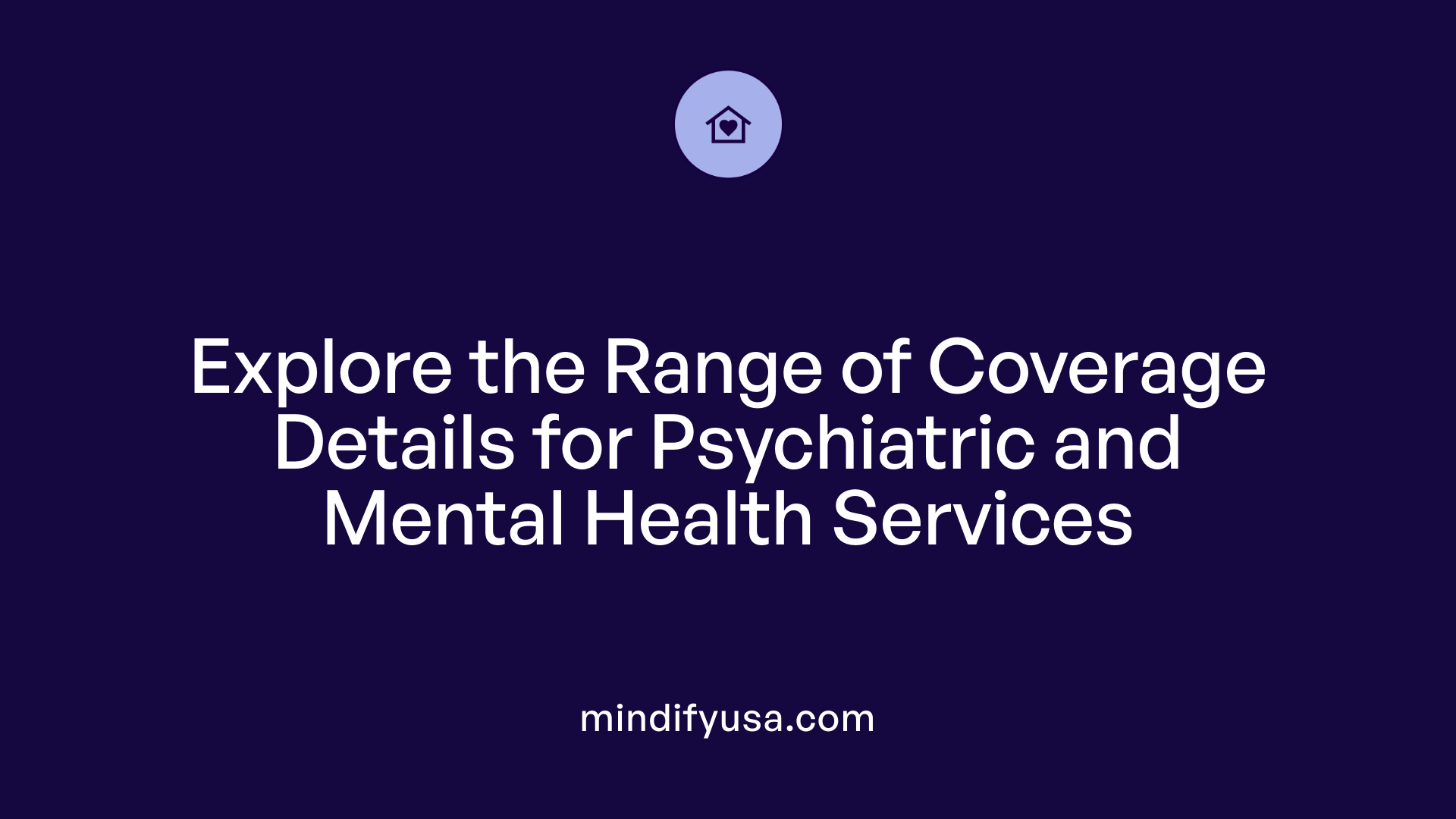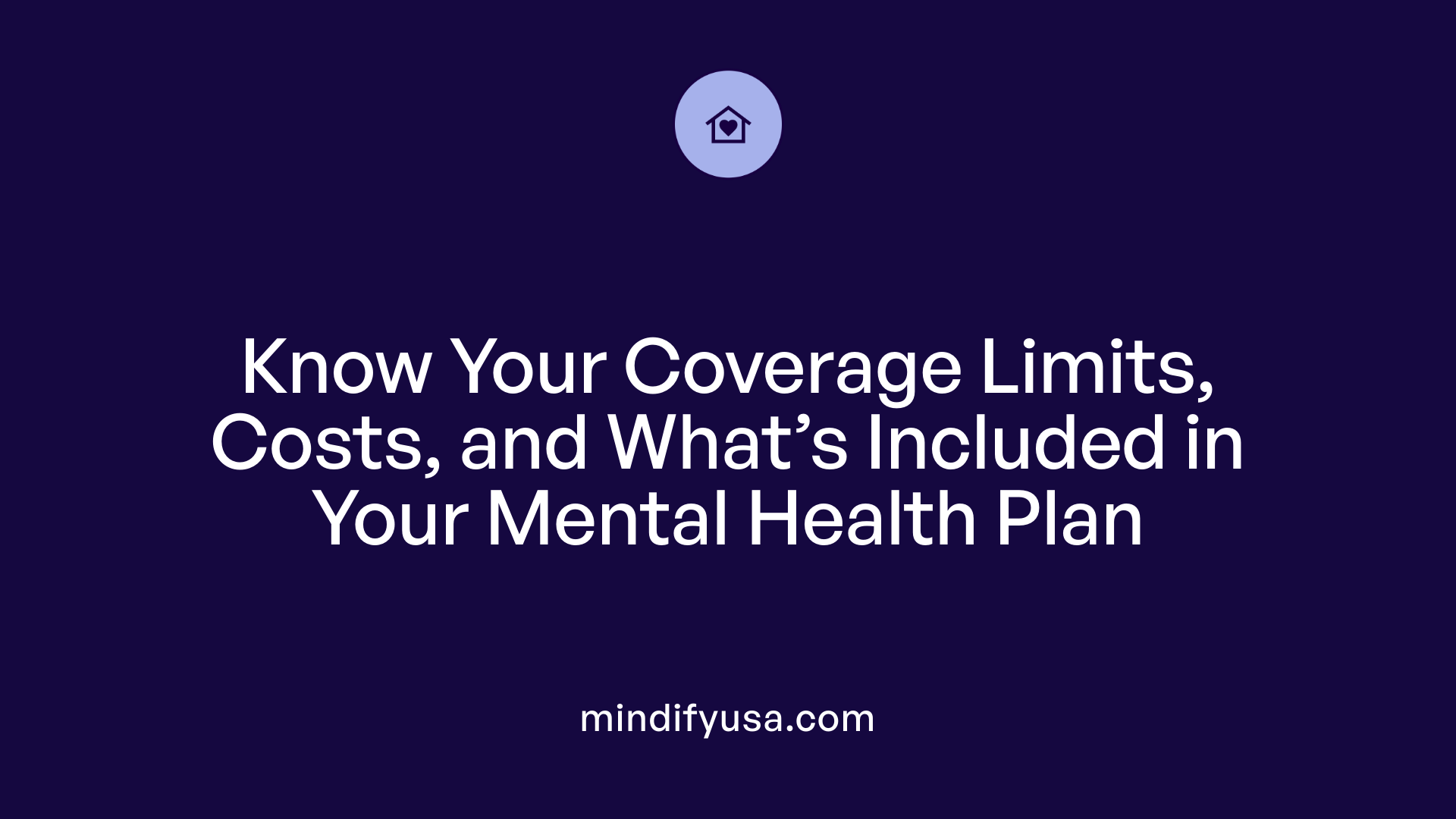Introduction to Psychiatric Care and Insurance
Navigating the landscape of mental health coverage can be complex, but understanding what insurance plans typically cover for psychiatric care is crucial for accessing necessary services. This article provides a comprehensive overview of various insurance options, mandated protections, how to verify coverage, and patients' rights and protections under current laws.
Types of Insurance Plans Covering Psychiatric Services

What types of insurance plans cover psychiatric and mental health services?
Most health insurance plans, including private insurance, Medicaid, Medicare, CHIP, and military coverage, offer coverage for psychiatric and mental health services as part of their essential health benefits. Under the Affordable Care Act (ACA), all Marketplace plans are required to include coverage for behavioral health treatments, inpatient and outpatient mental health services, and substance use disorder treatments. These plans also cannot impose annual or lifetime dollar limits on mental health benefits, providing ongoing support.
The Mental Health Parity and Addiction Equity Act (2008) enforces that mental health coverage is not more restrictive than coverage for medical and surgical benefits. This means copays, deductibles, visit limits, and other treatment standards must be comparable between mental health services and physical health coverage, promoting fairness and comprehensive support.
Private insurance plans, such as employer-sponsored and individual policies, typically include benefits like therapy, counseling, medication management, inpatient hospitalization, emergency psychiatric care, and sometimes virtual services like teletherapy and mental health apps. These services aim to improve access, privacy, and convenience.
Public programs such as Medicaid and CHIP extend coverage to low-income individuals and children. Medicaid provides inpatient and outpatient mental health services, psychiatric rehabilitation, crisis intervention, prescription drugs, and additional services depending on state-specific plans. CHIP, the Children’s Health Insurance Program, covers inpatient and outpatient mental health treatments, emergency care, and prescriptions for eligible children.
Medicare, primarily for seniors and disabled individuals, encompasses inpatient hospital stays for mental health, outpatient visits with licensed professionals, emergency services, and prescription drug coverage. The law ensures these services are accessible, with specific provisions for mental health screenings like depression assessments, which are covered annually without copays.
Military insurance programs like TRICARE and VA health benefits also include inpatient, outpatient, psychiatric residential treatment, emergency care, and medications. These benefits support active military members, veterans, and their families in managing mental health conditions.
Additionally, Marketplace plans are designed to comply fully with federal and state laws, ensuring they cover the mental health needs of their enrollees. They must also support additional services such as virtual visits, emotional support programs, crisis hotlines, and mobile health apps, encouraging timely and accessible mental health support.
In summary, coverage varies across different types of insurance, but most plans aim to offer comprehensive mental health support rooted in legal protections and medical guidelines. Ensuring awareness of specific benefits involves reviewing plan documents, consulting with insurers, or accessing online member portals.
| Plan Type | Coverage Features | Additional Notes |
|---|---|---|
| Private insurance (employer/individual) | Therapy, inpatient/outpatient, medication, virtual visits | Often requires in-network providers; benefits may vary |
| Medicaid | Hospitalization, outpatient services, crisis, prescriptions | State-specific; can include rehabilitative and in-home support |
| CHIP | Children's inpatient/outpatient, emergencies, prescriptions | Focuses on children; benefits tailored for pediatric needs |
| Medicare | Inpatient, outpatient, emergency, medications | Special provisions like free depression screenings |
| TRICARE/VA | Hospital, outpatient, residential treatment, meds | Designed for military/veterans; often extensive |
Understanding the specifics of each plan helps individuals access appropriate mental health services and navigate potential costs. Regularly checking coverage details, network providers, and prior authorization requirements can improve care accessibility.
Verifying Your Mental Health Coverage

How can I verify whether my insurance plan covers psychiatric care and mental health services?
To find out if your insurance plan includes coverage for psychiatric and mental health services, the first step is to contact your insurance provider directly. You can do this by calling the customer service number listed on your insurance card or by logging into your online member account through the insurer's portal.
When reaching out, be ready to provide your personal information, such as your full name, date of birth, and insurance ID number. Clearly ask whether your plan covers mental health and behavioral health treatments, including counseling, psychotherapy, inpatient and outpatient services, medication management, substance use disorder treatments, and emergency mental health services.
It’s important to inquire about any potential restrictions or requirements that might affect your access. This includes asking about:
- Visit limits, such as session caps or annual caps
- Prior authorization procedures
- Copayments, coinsurance, and deductible costs
- Coverage specifics for virtual mental health care or telehealth services
- Benefits for addiction treatment, crisis intervention, or emergency services
Request detailed explanations for any claim denials or coverage limitations. If you are interested in virtual therapy or online support programs, verify whether these are included and whether there are additional costs.
Additionally, many insurance providers offer online tools to verify coverage and benefits in real-time, facilitating a quick understanding of your specific plan. If you encounter uncertainties, you can also ask your insurer to send you a Benefits Summary or Explanation of Benefits (EOB) document, which details your coverage comprehensively.
In case of applying for new coverage or switching plans, review the plan’s summary of benefits and coverage (SBC) documents carefully—these outline what mental health services are covered and the associated costs.
Understanding your mental health coverage is essential for accessing appropriate care without unexpected expenses and for making informed decisions about your mental health treatment options.
Understanding Coverage Limitations, Costs, and Inclusions

What are the common coverage limitations, costs, and inclusions for mental health services under insurance plans?
Insurance plans that adhere to the Affordable Care Act (ACA) treat mental health services as essential health benefits, ensuring broad coverage for those in need. All Marketplace plans, Medicaid, Medicare, and employer-sponsored insurance are required to include coverage for mental health and substance use disorder services. This includes psychotherapy, counseling, inpatient and outpatient treatment, medication management, and crisis interventions.
One of the critical protections is that these plans cannot impose annual or lifetime dollar limits on mental health benefits—limits that previously restricted access to necessary care. The federal parity law enforces that coverage for mental health treatments must be on par with physical health benefits, ensuring similar restrictions and provisions across both.
Costs associated with mental health care involve several out-of-pocket expenses—premiums, deductibles, copays, and coinsurance. Typically, these costs are designed to resemble those for general medical services, although they can vary depending on the specific insurance plan, network status, and whether services are accessed virtually or in person.
Most health insurance plans require using in-network providers to take advantage of the full benefits, which can significantly reduce costs. Out-of-network services might either be covered at a lower rate or not covered at all, leading to higher expenses.
In addition to financial limitations, some plans may require prior authorization for certain services or treatments to ensure medical necessity. Denials of coverage can be appealed through formal processes, giving individuals a channel to challenge unfair or incorrect coverage decisions.
State-specific laws often strengthen federal requirements. For example, California mandates that mental health and substance use providers offer initial appointments within 10 business days, further increasing accessibility. These laws may also expand benefits to cover specific conditions like depression, bipolar disorder, and serious emotional disturbances in children, further broadening mental health care access in those states.
What services are typically covered?
| Service Type | Explanation | Additional Details |
|---|---|---|
| Behavioral health treatment | Psychotherapy and counseling aimed at mental health conditions | Includes individual and group therapy |
| Inpatient services | Hospital stays for mental health or substance use treatment | Often includes crisis stabilization units |
| Outpatient services | Therapy sessions, medication management, psychological testing | Can be accessed in clinics or via telehealth |
| Substance use disorders | Detox, rehabilitation, outpatient counseling | Coverage varies by plan; virtual options increasingly common |
| Crisis services | Hotlines, crisis intervention, emergency psychiatric care | 24/7 availability often included |
| Virtual mental health services | Teletherapy, phone, or video therapy sessions | Accessible through apps like Sydney Health, MDLIVE, Teladoc |
| Medications | Prescription drugs for mental health conditions | Covered if prescribed by licensed providers |
How do costs vary?
The amount individuals pay for mental health services depends on several factors:
- Premiums: Regular monthly charges for the health plan.
- Deductibles: The amount paid out-of-pocket before coverage begins.
- Copays and Coinsurance: Fixed amounts or percentage of costs paid when receiving services.
- Network Status: In-network providers cost less; out-of-network providers often lead to higher out-of-pocket expenses.
Virtual visits or online therapy programs such as Teladoc’s Mental Health Complete Plus may have different fee structures, sometimes offering unlimited access for a monthly fee or coverage at 100%, depending on the plan.
Are there restrictions or prohibitions?
Yes. Insurance plans cannot impose annual or lifetime dollar limits on mental health benefits. The Mental Health Parity and Addiction Equity Act prevents plans from setting more restrictive limits on mental health services compared to physical health services.
Furthermore, coverage for pre-existing conditions is mandatory—plans cannot deny care or increase costs because of prior mental health diagnoses.
In addition, many states have enacted laws demanding timely access to mental health services and increasing coverage for specific conditions, further reinforcing protections.
What about state-specific provisions?
California, for example, requires mental health professionals to offer appointments within ten business days of initial contact or referral, significantly reducing wait times. It also expands covered conditions, including autism, bipolar disorder, and serious emotional disturbances in children.
These regulations reflect a broader trend toward improving access and quality of mental health care at the state level, providing additional options and protections beyond federal requirements.
Legal Protections and Patient Rights in Mental Health Coverage

What protections and rights do I have regarding psychiatric care under my insurance plan?
As a patient, your rights regarding psychiatric care are well protected under various federal and state laws. Insurance plans, including those compliant with the Affordable Care Act (ACA) and the Mental Health Parity and Addiction Equity Act (MHPAEA), are mandated to provide equal coverage for mental health and physical health services. This means that your mental health treatments—ranging from psychotherapy and medication management to inpatient hospitalization—must be covered at the same level as medical or surgical treatments.
You have the right to access comprehensive mental health services without facing unfair restrictions or limits. For example, plans cannot impose higher copays, deductibles, or annual visit limits solely on mental health benefits. Additionally, restrictions such as lifetime or annual dollar limits on mental health treatments are generally prohibited, ensuring ongoing access to needed care.
Your insurance provider must clearly inform you about what services are covered, including details on network providers and any pre-authorization requirements. If a claim is denied, you have the right to challenge the decision through a formal appeals process. This process allows you to request reconsideration, provide additional information, or seek an independent review to ensure your treatment needs are appropriately met.
Furthermore, protections extend to your rights regarding privacy and confidentiality. Laws like the Health Insurance Portability and Accountability Act (HIPAA) safeguard your personal health information. Your provider cannot disclose your mental health records without your consent, except in specific situations such as emergencies or when legally mandated.
You are also protected against discrimination based on your mental health diagnosis or treatment history. Equal treatment laws aim to prevent employers, insurers, or service providers from unfairly discriminating against you or limiting your rights to humane and respectful care.
In summary, your rights encompass access to necessary mental health treatments, privacy, legal recourse in case of coverage denial, and protection from discrimination. Knowing these rights helps you advocate effectively for your mental health needs, ensuring dignity and dignity during treatment.
Strategies for Accessing and Utilizing Mental Health Services Effectively
How can I find mental health providers within my insurance network?
To locate mental health professionals covered by your insurance plan, your first step should be to explore your insurance provider’s online directory. Most insurers offer a searchable portal where you can filter providers based on location, specialization, and whether they accept your specific plan. This makes it easier to find nearby professionals who are in-network.
If online tools are not sufficient, customer service representatives from your insurance company can offer personalized assistance. Calling the customer service line can help clarify which providers are in-network and confirm what services are covered.
Before scheduling an appointment, always verify directly with the provider. Confirm they currently accept your insurance and inquire about coverage specifics, such as copays, copay limits, and whether you need prior authorization.
Platforms like Headway or other mental health service aggregators can connect you to in-network providers. When you add your insurance information to such platforms, you can compare costs, read reviews, and book sessions with licensed professionals directly.
Be aware that provider directories may sometimes be outdated or incomplete. It’s prudent to double-check with both the provider’s office and your insurer to ensure they accept your current plan and are listed as in-network.
By following these steps, you can streamline the process of finding accessible, covered mental health care tailored to your needs.
You can explore more about finding in-network providers by searching for "Finding in-network mental health providers" online, where numerous resources and tips are available.
In summary, using insurance directories, confirming with providers, and leveraging virtual platforms can help you access the mental health services you need without unnecessary costs or delays.
Summary and Final Insights
Understanding the scope of insurance coverage for psychiatric and mental health services empowers patients to access necessary care while navigating complex systems. Federal laws like the ACA and MHPAEA have expanded access and enforced equitable treatment, ensuring that mental health services are included as essential benefits without unjust restrictions. Verifying your coverage, knowing your legal protections, and utilizing available resources—such as provider directories, telehealth options, and patient advocacy—are vital steps to ensuring you receive comprehensive and affordable mental health care. Being informed and proactive ensures that mental health needs are addressed effectively, supporting overall well-being and recovery.
References
- Mental health & substance abuse coverage
- Understanding Mental Health Coverage In the U.S. | Anthem
- Mental health programs and benefits - United Healthcare
- Types of Health Insurance | National Alliance on Mental Illness (NAMI)
- Mental health care (outpatient) - Your Medicare Coverage
- Best Mental Health Insurance Of 2025 - Forbes
- Mental Health & Well-being Resources - Aetna






































































































